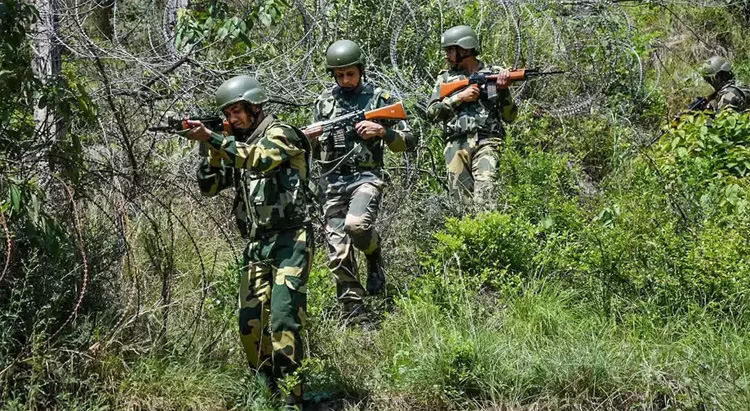Guerilla attacks, focus on Jammu part of Pak’s new tactic: Officials
Pakistan is changing its strategy to foment trouble in Jammu and Kashmir by sending highly trained and well-equipped terrorists for guerilla attacks on security convoys, camps and patrols instead of using them in the Kashmir valley to target civilians and minorities, officials familiar with the trend said.
Jammu, Rajouri, Poonch and Reasi districts appear to be the target of Pakistan and terror groups backed by it as Islamabad wants to revive militancy in the region, they said, seeking anonymity. Indian security forces are already “re- calibrating” their response, the officers said.
“The attack on 9 Para SF on May 5 in Rajouri (in which five soldiers were killed) and April 20 ambush on an army truck in Poonch (five personnel killed) were the handiwork of such trained men,” a counter-terrorism official said. “They had sophisticated weapons, sticky bombs and the attacks were well planned. Besides, the terrorists are using guerilla warfare tactics. They attack, go back to the jungle in the Pir Panjal area and regroup for another attack, instead of engaging with the security forces in the very first attack.”
There could be at least 30 to 40 highly trained terrorists present in Poonch and Rajouri, security officials reckon. Besides, assessment by security agencies suggests that other than battle-hardened terrorists, there is a possibility that Pakistan army regulars, who usually are part of border action teams, are also being sent to carry out these ambushes.
“While the trained terrorists appear to be using the Line of Control (LoC) to enter India and hide inside the forest, their commanders are also trying to establish their bases in Jammu region. In fact, one or two senior commanders of Al-Badr (terror group) may have already come to Jammu either via Nepal or Bangladesh,” a second officer said.
Targeting civilians, seen in large numbers in 2021 (41 killed, including migrant labour and Kashmiri Pandits) and 2022 (30), may not completely stop, but by switching its strategy, Pakistan wants to keep itself under the radar of the financial action task force (FATF), which removed it from the “grey list” in October last year, and avoid a backlash from the local populate over civilian killings in the valley, officer said. On January 1-2, terrorists killed seven civilians in twin attacks in Rajouri’s Dhangri village.
“It (Pakistan) has already created proxies of its trusted terror outfits, Jaish-e-Mohammad, Lashkar-e-Taiba, Hizbul-Mujahideen and Al-Badr, to deny its involvement in cross-border terrorism,” said the first officer.
The security forces have assessed that terrorists are using narco smugglers along with the LoC and up to Punjab to fund their activities and procuring weapons as traditional funding methods such as smuggling in the garb of India-Pakistan barter trade, hawala traders and shell companies have ceased following a crackdown.
The Indian government, intelligence agencies and security forces are monitoring the shift in tactics by Pakistan and “it’s only a matter of time before a security strategy is in place to deal with this new threat,” an officer said.
“Delhi is taking a lot of interest in increased terror activities in Jammu region. Regular meetings have taken place and we are in the process of re- calibrating our entire security strategy for the area. It won’t take long before we have a grip on the situation and a response strategy is in place,” said a third counter-terrorism officer posted near the LoC.
To provide adequate security the local border population in vulnerable areas of Jammu, Rajouri and Poonch, the Central Reserve Police Force and Jammu and Kashmir police have already imparted weapons training to 948 village defence guards, earlier known as village defence committees, which were revived after the Dhanri twin attacks so that they can defend themselves and maintain vigil along the border.
Besides, the National Investigation Agency has been raiding the cadre and overground workers of newly formed terror groups.
“Security forces’ counter-insurgency operations have put pressure on the terrorists operating in the valley. Moreover, the use of hybrid terrorists for targeted killings has failed to make any impact on the ground situation,” said internal security expert Sameer Patil . “Therefore, it appears that the Pakistan ISI (spy agency Inter Service Intelligence) and terrorist masterminds have now shifted their focus on the Jammu region by carrying out attacks targeting the security forces.”


Comments are closed.